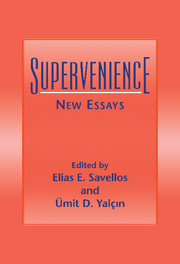Book contents
- Frontmatter
- Contents
- List of Contributors
- Introduction
- Varieties of Supervenience
- Supervenience: Model Theory of Metaphysics?
- “Global” Supervenient Determination: Too Permissive?
- Weak Supervenience Supervenes
- The Tweedledum and Tweedledee of Supervenience
- Reduction in the Mind of God
- Psychophysical Supervenience, Dependency, and Reduction
- Supervenience Redux
- Nonreducible Supervenient Causation
- Physicalism, Supervenience, and Dependence
- An Argument for Strong Supervenience
- Arguments for Supervenience and Physical Realization
- Supervenience and the Essences of Events
- How Does Ontology Supervene on What There Is?
- Supervenience and Intentionality
- Supervenience, Coherence, and Trustworthiness
- Does Truth Supervene on Evidence?
- Index
“Global” Supervenient Determination: Too Permissive?
Published online by Cambridge University Press: 29 March 2010
- Frontmatter
- Contents
- List of Contributors
- Introduction
- Varieties of Supervenience
- Supervenience: Model Theory of Metaphysics?
- “Global” Supervenient Determination: Too Permissive?
- Weak Supervenience Supervenes
- The Tweedledum and Tweedledee of Supervenience
- Reduction in the Mind of God
- Psychophysical Supervenience, Dependency, and Reduction
- Supervenience Redux
- Nonreducible Supervenient Causation
- Physicalism, Supervenience, and Dependence
- An Argument for Strong Supervenience
- Arguments for Supervenience and Physical Realization
- Supervenience and the Essences of Events
- How Does Ontology Supervene on What There Is?
- Supervenience and Intentionality
- Supervenience, Coherence, and Trustworthiness
- Does Truth Supervene on Evidence?
- Index
Summary
Introduction
Everything whatever is determined by the physical. So goes the sweeping physicalist slogan. The thesis is “global” in the sense, among others, of being about all things and their properties everywhere everywhen. For each thing in the world and for any nonphysical property it may have – mental, semantic, valuational, whatever – physical conditions determine whether it has that property. An equivalent formulation of the thesis, current in the literature, is this: given the physical conditions that obtain in our world, and given any other world in which the same physical conditions obtain, the two worlds are the same as regards what things have what nonphysical properties. Worlds that are physical duplicates are duplicates in nonphysical conditions as well.
Which worlds? Probably the physically possible worlds (the ppws) – those in which the laws of physics hold. The sweeping thesis is not meant as a logically or conceptually necessary truth, and as we will see in Section 5, the empirical evidence for it warrants generalization only over the ppws. In any case, the thesis is “global” in a further sense: it generalizes over all the relevant worlds and over whole worlds to boot. This is especially clear in the following formulation, also current: in ppws, the physical conditions φ determine the nonphysical conditions ψ iff
(D) Given any two ppws, if the same φ-conditions obtain in both, the same ψ-conditions obtain in both,
where the same physical (or other) conditions obtain in both of two worlds just in case, for each such condition χ, χ obtains in one iff χ obtains in the other.
- Type
- Chapter
- Information
- SupervenienceNew Essays, pp. 73 - 100Publisher: Cambridge University PressPrint publication year: 1995
- 6
- Cited by



